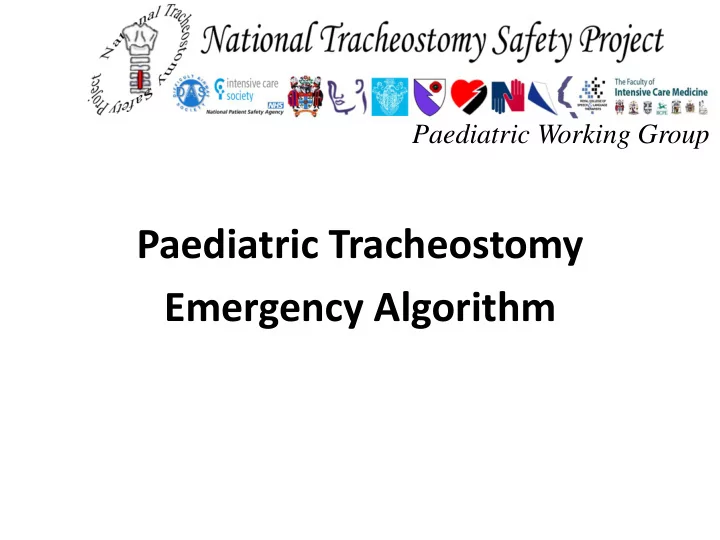

Paediatric Working Group Paediatric Tracheostomy Emergency Algorithm
Outline Tracheostomy in children Tracheostomy Emergencies National Tracheostomy Safety Project Tracheostomy Package Emergency Algorithms
Tracheostomy in Children Increasing complexity of patients Increase in length of hospital and PICU stay Increasing numbers of Tracheostomy patients National demand for LTV Our mission to keep them safe
National Tracheostomy Safety Project Dr McGrath (Manchester) Identified tracheostomy and laryngectomy safety concerns Early complications due to haemorrhage, blockage or displacement with a high likelihood of harm NAP4 found that death occurred in up to 50% of patients in these areas when a tracheostomy became displaced Developed with Resuscitation Council UK – training and guidance documentation
Tracheostomy Package Tracheostomy website TRACHE poster BEDHEAD signs RESUS algorithm
The resuscitation algorithm
Bedhead Sign Essential information • Patient • Tracheostomy • Suction • Upper airway • Emergency plan In an Emergency - call for help! 2222 - ENT surgeon (consultant) & Resuscitation Team At home - 999
SAFETY, STIMULATE, SHOUT FOR HELP, OXYGEN SAFETY – ensure you are safe to approach, stimulate the patient ‘hello …..’ Shout for help AIRWAY – try to get a position suitable for the child – placing a roll under the shoulders can help to open up the neck and give access to the stoma OXYGEN – if available, high flow oxygen should be provided to the face and stoma – this will allow oxygen to get in to the lungs if there is any air movement CAPNOGRAPH – a trained secondary responder may be able to put capnography (CO2 monitoring) in line with the tracheostomy to help assess if it is patent.
SUCTION TO ASSESS TRACHEOSTOMY PATENCY SUCTION the tracheostomy to assess whether it is patent (unblocked). To do the suction, make sure any attachments are removed. Humidifiers (HME), speaking valves or inner tubes can all become blocked. Remember – if you remove the inner tube you will need to replace it with a fresh or unblocked inner tube before you can use it to bag-ventilate. If the suction catheter doesn’t pass, assume the tracheostomy is blocked.
EMERGENCY TRACHEOSTOMY TUBE CHANGE In an emergency, if the tracheostomy is blocked – you must remove it. Once the tracheostomy is removed, you must then replace it with a suitable tube. In an established tracheostomy, start by attempting to place the same size tube. If this won’t pass, then try the size smaller from your emergency TRACHE box. If unsuccessful, you can try passing the smaller tube in over a suction catheter being used as a guide (& try spreading the skin either side of the stoma). IF YOU CAN’T GET A TUBE IN QUICKLY, DON’T KEEP TRYING, REMOVE THE TUBE AND MOVE ON TO ASSESSING BREATHING
Suction catheter guided tube change
RESCUE BREATHS AND CPR If the patient isn’t breathing adequately, give 5 rescue breaths May use UPPER airway (mouth/nose) but if this is ineffective you can also use the TRACHEOSTOMY or DIRECT STOMA with a small face mask / LMA CPR should be started if the child is not showing signs of life or if Heart Rate <60 Continue CPR and make sure the resuscitation team or 999 emergency services are contacted If the patient responds to the treatments, continue giving oxygen Observe closely and check for any developing problems.
ADVANCED RESPONSE The Advanced response prioritises ways to administer OXYGEN . This can be to the upper airway or through the stoma. Once a trained assistant attends, the process of intubating the upper airway or stoma can be attempted if safe. Additional equipment should be available in the Emergency Department or intubating areas in the hospital .
Established Tracheostomy Bedhead Sign A combined form with a bedhead sign and the Basic Response algorithm in one place which is easy to see and access. A copy of this can be kept in the TRACHE box.
Recommend
More recommend